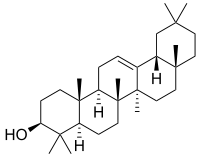Amyrin
 α-Amyrin | |
 β-Amyrin | |
| Names | |
|---|---|
| IUPAC names
α: (3β)-Urs-12-en-3-ol β: (3β)-Olean-12-en-3-ol δ: (3β)-Olean-13(18)-en-3-ol | |
| Other names
α: α-Amyrenol; α-Amirin; α-Amyrine; Urs-12-en-3β-ol; Viminalol β: β-Amyrenol; β-Amirin; β-Amyrine; Olean-12-en-3β-ol; 3β-Hydroxyolean-12-ene | |
| Identifiers | |
| 3D model (JSmol) |
|
| ChemSpider | |
| ECHA InfoCard | 100.010.321 |
| PubChem CID |
|
| |
| |
| Properties | |
| C30H50O | |
| Molar mass | 426.73 g·mol−1 |
| Melting point | α: 186 °C[1] β: 197-187.5 °C[2] |
| Except where otherwise noted, data are given for materials in their standard state (at 25 °C [77 °F], 100 kPa). | |
| Infobox references | |
The amyrins are three closely related natural chemical compounds of the triterpene class. They are designated α-amyrin (ursane skeleton),[3] β-amyrin (oleanane skeleton) [4] and δ-amyrin. Each is a pentacyclic triterpenol with the chemical formula C30H50O. They are widely distributed in nature and have been isolated from a variety of plant sources such as epicuticular wax. In plant biosynthesis, α-amyrin is the precursor of ursolic acid and β-amyrin is the precursor of oleanolic acid.[5] All three amyrins occur in the surface wax of tomato fruit.[6][7] α-Amyrin is found in dandelion coffee.
References
- ↑ Merck Index, 11th Edition, 653
- ↑ Merck Index, 11th Edition, 654
- ↑ Saimaru, H; Orihara, Y; Tansakul, P; Kang, YH; Shibuya, M; Ebizuka, Y. "Production of triterpene acids by cell suspension cultures of Olea europaea". Chem Pharm Bull (Tokyo). 55: 784–8. PMID 17473469.
- ↑ Tansakul, P; Shibuya, M; Kushiro, T; Ebizuka, Y. "Dammarenediol-II synthase, the first dedicated enzyme for ginsenoside biosynthesis, in Panax ginseng". FEBS Lett. 580: 5143–9. PMID 16962103. doi:10.1016/j.febslet.2006.08.044.
- ↑ http://www.phytojournal.com/vol2Issue2/Issue_july_2013/37.1.pdf
- ↑ https://www.ncbi.nlm.nih.gov/pmc/articles/PMC5278499
- ↑ Bauer, Stefan; Schulte, Erhard; Thier, Hans-Peter (2004). "Composition of the surface wax from tomatoes II. Quantification of the components at the ripe red stage and during ripening". European Food Research and Technology. 219: 487–491. doi:10.1007/s00217-004-0944-z.
This article is issued from
Wikipedia.
The text is licensed under Creative Commons - Attribution - Sharealike.
Additional terms may apply for the media files.